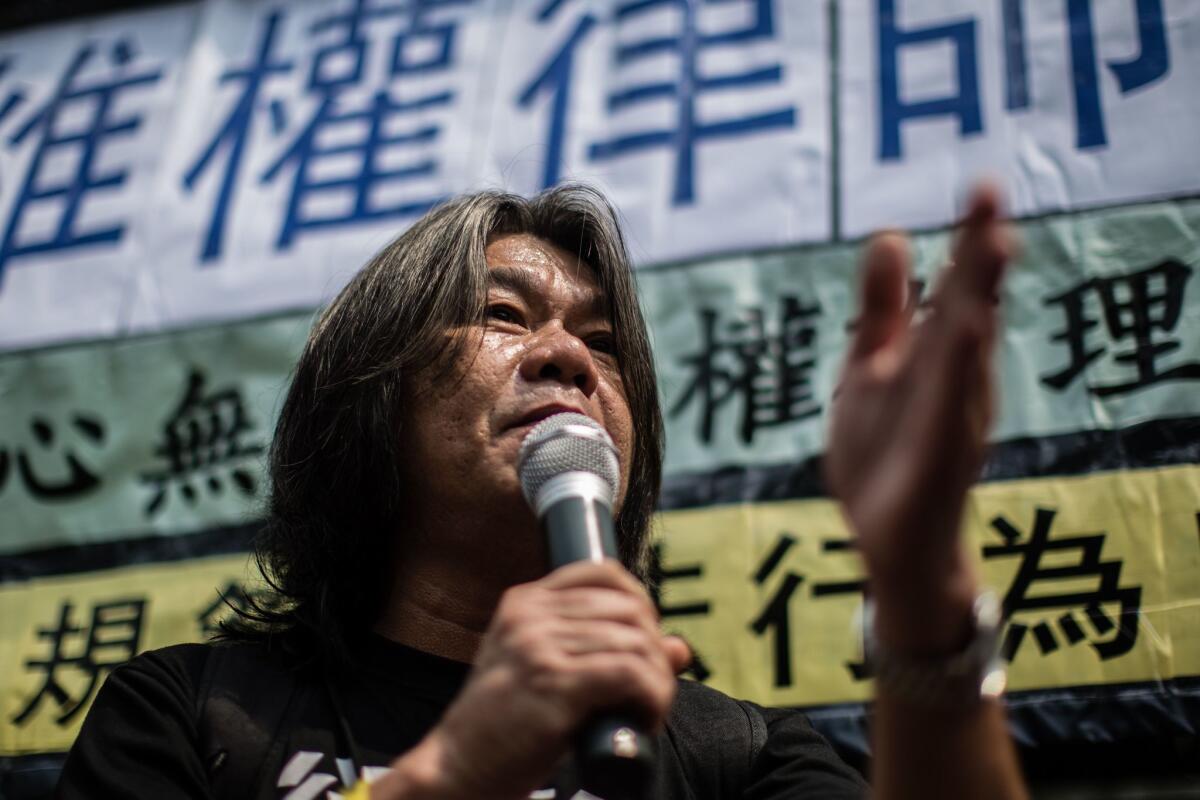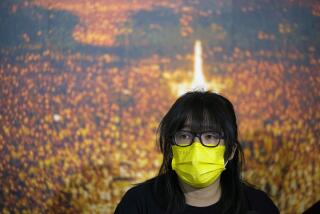China claims human rights lawyers were part of ‘criminal syndicate’

Hong Kong legislator Leung Kwok-hung of the League of Social Democrats speaks during a July 12 protest in Hong Kong after dozens of Chinese human rights lawyers and activists were detained or questioned in a police sweep.
- Share via
Reporting from Beijing — In the face of international condemnation for a mass roundup of human rights lawyers, China’s authorities have responded with what they claim is evidence of a “criminal syndicate” of rights activists and lawyers who purportedly galvanized public support for profit.
China Central TV on Sunday broadcast what it billed as the confession of a hired-gun human rights activist who told authorities he had colluded with a Beijing law firm in fanning public sentiment on as many as 40 legal cases. State TV said the alleged conspiracy “grievously disrupted social order in the name of justice and public interest.”
Between Friday and Monday evening, more than 100 lawyers and their assistants were detained for interrogation, and 15 were believed to remain in custody, including six from the Beijing Fengrui Law Firm. The roundup swept across 15 provinces, spanning more than half of the country.
A partner in the Beijing firm, Zhou Shifeng, was detained Friday afternoon, just hours after he had celebrated the release of a client, Zhang Miao, formerly a news assistant for Die Zeit, the German newsweekly. Zhang had been in police custody since last October, with authorities alleging she supported pro-democracy demonstrations in Hong Kong.
Some China observers see the unprecedented sweep as part of a vigorous push under President Xi Jinping to put a lid on dissent and create an image of social harmony, but they warn that the means being deployed could have pernicious results.
“This is more than about harmonizing,” said a spokesperson for the Hong Kong-based China Human Rights Lawyers Concern Group. He said the government was using “the pretext of national security” to bend the law to its own purposes.
Last month, a national security law was promulgated by China’s National People’s Congress, giving law enforcement sweeping and vaguely defined powers to safeguard the country’s core interests.
“We are deeply concerned that the broad scope of the new National Security Law is being used as a legal facade to commit human rights abuses,” State Department spokesman John Kirby said in a statement. “We strongly urge China ... to release all those who have recently been detained for seeking to protect the rights of Chinese citizens.”
Though it remains unclear whether the new law is related to the mass roundup, Mo Shaoping, a veteran human rights lawyer in Beijing, said the lawyers targeted by the government could have been dealt with through civil means or professional disciplinary actions.
“Using the cudgel of criminal law in this case represents a gross abuse of power,” said Mo, who counted among his clients Liu Xiaobo, the Nobel Peace Prize winner who is now serving his fourth prison term -- for inciting the subversion of state power. Mo said he hasn’t been part of the roundup.
The China Central TV broadcast revealed that it was the Ministry of Public Security that coordinated the investigation into human rights lawyers and their staffs. Although the target of the investigation was reported to have initially been the Fengrui firm, authorities cast the dragnet much further.
Law is a special correspondent.
More to Read
Sign up for Essential California
The most important California stories and recommendations in your inbox every morning.
You may occasionally receive promotional content from the Los Angeles Times.










